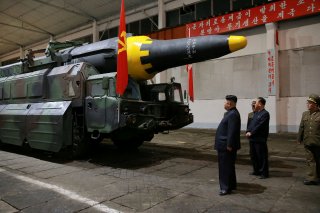Joe Biden’s North Korea Policy: The Status-Quo Before Donald Trump?
North Korea will likely be a mid-level issue for Biden: occasionally grabbing attention when the North does something outrageous, but otherwise, the stalemated status quo of the last decade will likely reassert itself.
There has inevitably been much discussion since Joseph Biden’s election victory of how he might change American North Korea policy. Much of it turns on hopes that Biden will pursue more fruitful engagement than the erratic negotiations of current U.S. president Donald Trump in the last few years.
This should indeed be the case. Biden is obviously an establishmentarian. He has deep roots in the foreign policy community of Washington, DC. He was chairman of the Senate Foreign Relations Committee and played a major foreign policy role as vice-president to former President Barack Obama. And his cabinet selections to date have been seasoned Washington hands.
The contrast with Trump will be fairly obvious. Biden will be more steady on North Korea, rather than swinging dramatically from confrontation to conciliation as Trump did. Nor will Biden place as much emphasis on public relations. All the Trump sideshows—the search for a Nobel Prize, the forced bonhomie with North Korean leader Kim Jong-un, the outlandish language—will disappear.
Instead, Biden will return to the long slog that is negotiating with North Korea. There will be no summit unless negotiations merit it, so most of the work will re-submerge into the depths of the State Department and North Korean Foreign Ministry. Perhaps some manner of deal will arise from working level-talks. But given how poorly such efforts have gone in the past, this is hardly likely.
There will be no war threats, nor rhetorical attacks on America’s South Korean ally. Instead, North Korea will likely be a mid-level issue for Biden: occasionally grabbing attention when the North does something outrageous, but otherwise, the stalemated status quo of the last decade will likely reassert itself. And with so many other issues afoot—coronavirus, tense relations with China, repairing alliances—the Biden team is likely to accept that stalemate by default.
The status quo is not ideal, but it is one all sides have slowly accustomed themselves to and can live with given the risks of change. It is essentially a stalemate. North Korea remains unbowed—still a Cold War relic, unliberalized and Orwellian—and it has nuclear weapons. So long as those are not proliferated, the world resigns itself to the permanent sanction, isolation, deterrence, and containment of the North.
In other words, the Korean division remains as entrenched as ever, and although now nuclearized, it remains basically stable. The United States is unwilling to risk war for denuclearization, and so long as the North is responsible with its nuclear program, the United States is accommodating itself to North Korea as a nuclear weapons state. The United States will never admit this, however, and the cost for North Korea is permanent exclusion from world politics. The North Korean elite, in turn, is willing to accept this banishment as it does not care if its people suffer the costs of global isolation, and it also believes, rightly, that nuclear weapons are its best deterrent against external attack.
This status quo is unhappy and dangerous: it punishes the North Korean people brutally; it dramatically raises the level of violence possible if the Korean War returns; it leaves a geopolitical flashpoint permanently unresolved with all the possibilities of misperception and inadvertent incidents that entails. But it is also stable. All sides prefer it to the costs of pursuing change:
-
The United States would like denuclearization, but the costs are too high: Strikes raise the possibility of war; a deal would require huge U.S. strategic concessions, such as the withdrawal of the United States from South Korea, which Washington is unwilling to make. So the United States has adjusted.
-
The North would like sanctions lifted and normalization, but the costs are also too high: Denuclearization is the clear price for an entry into world politics as a (somewhat) normal state. The United Nations Security Council has voted for sanctions, and even China and the dovish South Korean left support the North’s denuclearization. Given that the Pyongyang elite can push the costs of sanctions off onto the population—the people who run North Korea can still access the luxury goods of the global economy through smuggling—it too has chosen to adjust.
It is not clear what Biden can do to alter these deep-seated structures behind the grim, long-standing status quo. Trump tried all sorts of antics and gimmicks, only to drop North Korea as an irresolvable issue. His predecessor Obama tried a deal in 2012 which fell apart almost immediately. The South Korean left, now in power, has tried relentlessly for years to pull North Korea out of its shell, only to regularly receive Pyongyang’s abuse.
So Biden will likely give North Korea a “college try”—he will put out diplomatic feelers, consult with allies, go slow on the rhetoric—but it is unlikely he would make the huge concessions the North would demand for denuclearization. And there will be many other pressing issues. So the status quo stalemate is likely to return, and that will be good enough for Biden.
Robert E. Kelly is a professor of international relations in the Department of Political Science and Diplomacy at Pusan National University.

